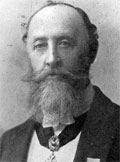Born in Dublin and educated in Nice, Clongowes Wood and Trinity College, Dublin, George Noble Plunkett was founder and editor of the magazine "Hibernia", a review of literature and art. He published his first volume of verse "God's Chosen Festival" in 1877 and was created a Papal Count by Pope Leo XIII in 1884. He was called to the Bar the following year but never practiced. He developed a career in literature, art criticism and culture, serving as Director of the National Museum (1907-1916), Vice-President of the Royal Irish Academy (1908-1909, 1911-1914) and President of the Royal Society of Antiquaries of Ireland. He was politicized by the execution of one of his sons, Joseph Mary, an organizer of the Easter Rising of 1916, and was returned as an abstentionist independent MP for North Roscommon in the 1917 general election. He chaired the second meeting of Dáil Éireann on 22 Jan 1919 and served as Minister for Foreign Affairs in the First Dáil Éireann (22 Jan 1919 - 26 Aug 1921), accompanying Eamon de Valera to London for the negotiations with David Lloyd George in July 1921, and as Minister for Fine Arts (26 Aug 1921 - 9 Jan 1922). He opposed the Treaty, refused to take the seat he held for Roscommon, and continued to support Sinn Féin after the split with Fianna Fáil. Biography source: [2] |

